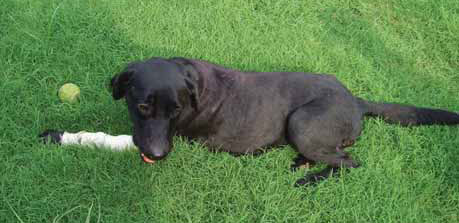

An excess of money and dearth of compassion often leads to pedigreed pets being abandoned
By Shreya Bhat, New Delhi
Chunky watches, stone washed jeans, shoes, perfumes, sunglasses and even handbags. In an upwardly mobile society where ʻbrandedʼ is beautiful and ʻdesignerʼ is in, itʼs not surprising that dogs too have been added to the list of must-haves. Dogs are the posh and wealthy Indianʼs new fashion accessory. And breed is the brand that rules the market.

Photo: Bharti Verma
Money can buy you doggy love
Exotic breeds such as the Beagle, the squash-nosed Pug, and large breeds such as Labradors, Mastiffs, German Shepherd, Siberain Husky, St. Bernard, and Great Dane are in demand not for their companionship, but for their value as status symbols. In Delhi, the National capital, people gift expensive puppies to their friends and corporate partners, without considering that a pet means hard work and responsible care.
Dr. Sunita Nauriyal, President of Cure and Care Animal Help Foundation says, “It now seems to be a social requirement to have a big dog to match a big house. These large breeds like Irish Setters, Mastiffs and Rottweilers are prized as guard dogs and status symbols, but most people donʼt know how to handle them.”
The price tags on these dogs can border on the absurd. While everpopular Labradors can go for anything around Rs.10,000, the more exotic breeds such as Chihuahua can go for anything between Rs. 50,000 to even Rs. 70,000. Some breeders also claim to have imported highly pedigreed Mastiffs and Danes for exorbitant rates running into lakhs.
Dear but disposable
However, it seems that a lengthy pedigree and a five-figured price tag do not guarantee a life time of rubber toys and dog biscuits for these canines.

Photo: Sherya Bhat
Local animal shelters in Delhi are receiving a large number of abandoned pedigreed pet dogs on a daily basis, many of whom are found wandering the streets starved, diseased and traumatized. Most of them die painful deaths from disease, starvation or road accidents. They are attacked by territorial street dogs and suffer grievous injuries. Only a lucky few get picked up by animal welfare rganizations, like People for Animals, Cure and Care Animal Help Foundation, Friendicoes and Red Paws Rescue which then try to re-home them.
A lucrative job offer in another city or abroad, or the addition of a baby to the family provide sufficient pretext for turning a dog out onto the streets.
Sometimes pet owners do not have the patience to get their dogs treated when they fall ill or get injured. Maxi, a handsome two-year-old Beagle, was brought to a vet with maggot infestation in his ear and mouth. After being told of the treatment required, the owner simply left Maxi on the street near the clinic and walked away.
Old dogs are the most prone to be abandoned. In a heart-rending case, Tabasco, a 14-year-old Daschund, was sent to the shelter of Cure and Care with a driver, with instructions that he should be uthanized. The ownerʼs reasons were that the dogʼs sight was failing, and it was too much trouble to care for him. Tabasco was fortunately later adopted by a family who were prepared to see him through his waning years.
Amin Khan, an animal rights activist, describes a case he was involved in where a Daschund was found left starved and weak in the compound of a house a couple of weeks after his owners had moved away. “Certain people who are frequently transferred from city to city, keep a dog in one and then leave it behind, only to buy another dog in the next city,” he says. This practice of buying expensive dogs on a whim and later discarding them or replacing them – in the way one would upgrade oneʼs car, computer or music system – points to the treatment of pets in purely materialistic terms and the absence of an attitude of genuine care.
Ill-considered decisions
Many prospective pet owners are clueless about the responsibility that comes with keeping a pet. There are several cases of people approaching animal shelters, voluntarily giving
up their pets for adoption because they can no longer provide the proper care for the dog.

Photo: Bharti Verma
Several breeds of dogs have specific dietary and exercise needs, and are of delicate constitution, unlike their sturdy ʻindieʼ counterparts. “It has become a social requirement for a big house to have a big dog as either a guard dog or as a fancy item to show off to oneʼs friends,” says Dr. Nauriyal. Some people go as far as to buy dogs like the Siberian Husky and St Bernard which are not suited to the hot dry weather of Delhi. Many dog owners have these big dogs of large breeds, and these dogs are not given the exercise they need.
This can badly affect their gait and their psychological development, and they turn into aggressive and hyperactive dogs. A sad consequence of such ill-treatment and neglect is that when such dogs that have turned vicious end up at shelters, they sometimes have to be euthanized. This is not a fact animal welfare NGOs like to openly acknowledge.
The problem with breeding
To meet the high demand for specific breeds, unscrupulous breeders often breed the same pair over and over again. Such unregulated breeding not only affects the health of the female, but also that of the puppies. Inbreeding between closely related dogs and bitches produces puppies that are prone to genetic defects and psychological disorders.
Some activists claim that vets and breeders work hand in hand to reap profits from this thriving business of dog breeding. There is an increasing trend of unlicensed ʻbackyard breedingʼ wherein inexperienced and uninformed individuals, sensing a lucrative business opportunity, simply buy a pair of dogs and breed them. There are reports of vets who indiscriminately issue certificates of health and details of pedigree and vaccinations for the dogs. This is how unregulated breeding practices fuel the entire phenomenon of pet abandonment.
Scars of abandonment
The ailments and injuries these dogs suffer during their ordeal on the street fade with time. But the psychological effects of abuse and abandonment can be far more lasting. Danny, a 3-year-old Golden Retriever and a resident at the Cure and Care shelter for the last eight months, has been depressed ever since he was rescued. He does not socialize with other dogs, and gets aggressive when approached by visitors to the shelter.
Doll, a Terrier who was rescued last year, had apparently been so badly treated by her owner, that she would attack any man who tried to approach her. Three attempts at getting her adopted failed when she attacked the male members of the families she was sent to.
Cases of failed adoptions like these are rare. But Dr. Nauriyal vouches for the success of the adoption of adult dogs. “It is a misconception that adult dogs that have been abandoned cannot successfully adjust to a new home. They just need to be treated with patience,” she says. It is the responsibility of vets, breeders, and pet shop owners to properly inform prospective pet owners about pet care and the pros and cons of keeping a dog of a specific breed. “Education and consciousness are the most important factors that could prevent more such cases of abandonment of pets,” says Dr. Nauriyal.
Better regulation of breeding too is required to ensure that the dogs are in good health and are of good stock.
Customers in turn need to be sure about their reasons for keeping a dog, and must consider whether they have the space and resources to care for the dog. After all, a dogʼs whole world revolves around itʼs owner, and if abandoned, it feels bereft.
In times where consumerism is king, it is surprising that such pedigreed dogs are not being meted out better treatment. Such cases of apathy and abandonment point to a fundamental lack of compassion and to the extraordinary prevalence of materialistic tendencies in our personal relationships and attitudes.
As imported cars trundle on the streets of Delhi, and malls fill with eager shoppers in pursuit of the best brands and bargains, these stories of dogs now out of fashion should not
get lost in the cacophony of the Capital.



